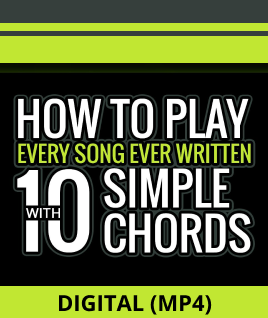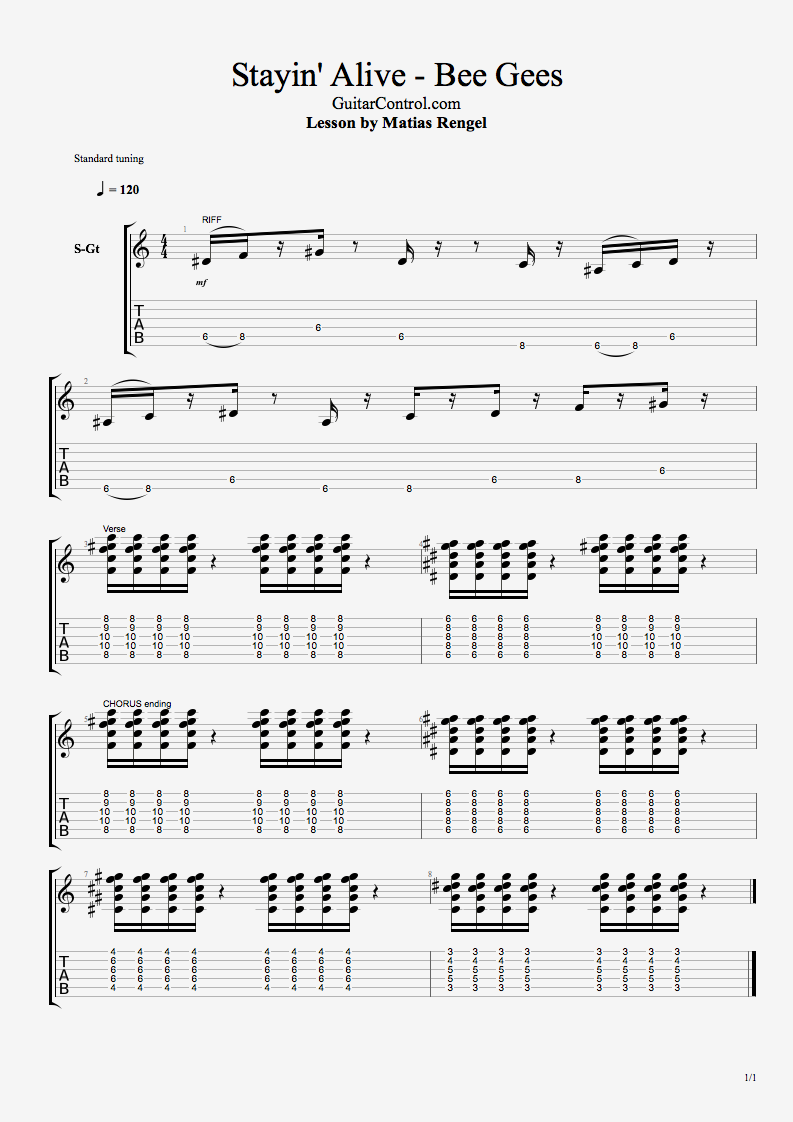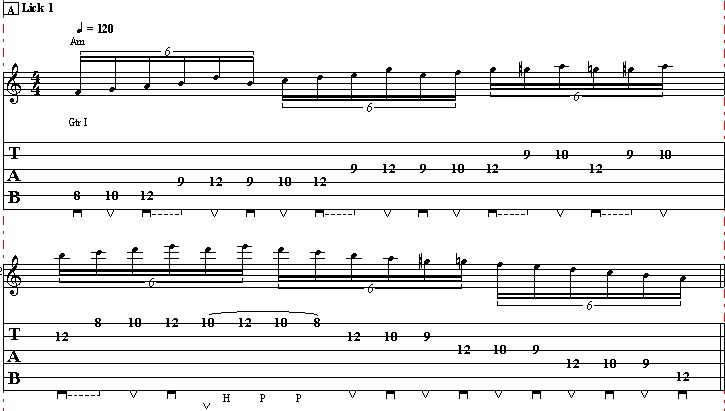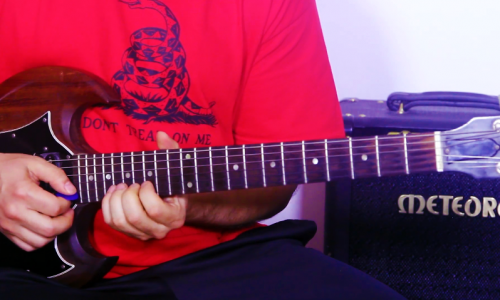Hey, how’s it going this is Matias Rengel with Guitar Control, I’m going to show you how to play this awesome riff by the Bee Gee’s called “Stayin Alive”. We’re going to be exploring the actual baseline and we’re going to play it on guitar of course. It’s going to be really cool and will be playing some of the chords as well.
[ninja-popup ID=715]
Click on the Tabs button to follow the chords and tabs.
We are on F minor and of course later you can transpose it to different keys to adapt it to your voice totally fine with that and what we’re going to is the 5th string, 4th string and the 6th string. Let’s start on the 6th fret of the 5th string and we’re going to hammer-on into the 8th fret of the 5th string, by the way this is a super simple riff and you’ll able to play it by the end of this lesson so stay with me.
So after that you’re going to go into the 6th fret of the 4th string and you’re going to play it with your index finger, just practice. Now once you got that down we’re going to go with the same index that you play in this one and you’re going to move it up a little bit to the next string 5th string and you’re going to play the 6th fret on the 6th string, the easy part is that you have to release the pressure there, no issue with doing something like that and say how do I move my index? You know right, usually after you play the 6th fret of the 4th string you release the pressure but don’t remove the finger; otherwise you’re going to get the 4th string sounding.
Then you move it and play 6th fret of the 5th string, now we’re going to do the next part. You go into the 6th string and play the 8th fret and then you go into a 6th fret and hammer-on into the 8th fret and play the 6th fret of the 5th string. Right now we have two different parts; it’s important for you to learn and see the legs as two different parts so you can like identify it and play and learn it easier.
The next part you’re going to have two parts and the 2nd part is cool it’s almost as if someone is like singing and someone else is replying. After that we’re going into the 6th fret and you’re going to do the same and avoid playing the 6th fret at the beginning then you just play straight up 6th come around to the 8th and 6th on the 5th and repeat
Now we go into the ending of this little riff which is going to be super easy, you’re going to go 6A of the 6th string, 6A of the 5th string and 6A of the 4th strings; we play the superstore for you.
Now that sounds cool enough for the recording because you can get many stuff going on in the background the drums, the bass, I think the guitars everything is like but if you play this alone on your own it’s going to sound a little bit boring so what I want you to do is add a little bit of muted notes which will make it a little bit more interesting perhaps the muted notes are not part of the recording right because I mean this is originally a baseline but I mean you can make it sound really cool with it with muted notes, it’s going to sound like this and you can just move your hands, this is a very simple concept actually every time you release, you play the note you can and release the pressure and you have to play a muted note so the idea of this is that you keep on going with the 16 notes right because this was like 1, 2, 3, 4, 16, notes would be that you are putting four notes per beat right 1, 2, 3, 4, 1 & 2, but 2, 3, 4, 1, 2, 3, 4, 1, 2, 3, 4, 1, 2, 3, 4, 1, 2, 3, 4.
You have the 16 notes like 1, 2, 3, 4, 1, 2, 3, 4, 1, 2, 3, 4, 1, 2, 3, 4, 4, 1, 2, 3, and 4. What I want to do is to go with the pick up and down, down and up. It’s not super simple it’s a little more complicated than a simple version but it’s going to make it cooler and there you are another thing to practice once you learn the actual riff.
The chords are very simple actually for this song it starts on an F minor. You’re going on with the riff because when it starts it actually doesn’t repeat the riff, the guitar is going from f-minor, when the league finishes it goes through the minor to b-flat major. Now when you start singing it changes actually it’s going from A minor to E flat major, then you go to a B flat major.
In the chorus, all the time it’s an F minor except at the end where you go into a flat major E flat major in C minor sustained. Now the chords that I’m using, is the 8th fret across all the strings with the index finger and then you go with your ring finger on the 10th fret, pinky finger on the 10th fret, middle finger on the 9th fret that will be 2nd string, 3rd string, and 4th string.
Now for the B flat major you bring this same shape two frets down and this finger is the pinky, ring and middle finger, bring them up a string. For the E flat major what you’re going to do is move your middle finger a fret up but it’s easier if you just move the ring and pinky one string down and put the middle finger on the 4th and then for the D flat major you just got to move it straight down and now for the C minor is the same as the F minor but on the 3rd fret.
The rhythm is not really you can play in any reason that you want to do for this song. I like this rhythm like this 1, 2, 3, and 4, muted then 1, 2, 3, 4, and then you have it. That’s a really cool song by the Bee Gees, I hope you’ve enjoyed it and make sure to subscribe on our YouTube Channel and we’ll see you in our next video lessons, thanks for watching.




